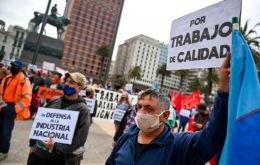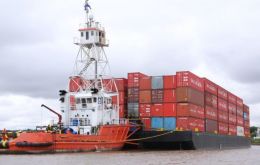MercoPress. South Atlantic News Agency
Economy
-
Saturday, September 18th 2021 - 09:24 UTC
Latin America viewing Celac as a substitute for OAS during Summit starting in Mexico City

The Community of Latin American and Caribbean States (Celac) Summit will start Saturday in Mexico City as the body seeks to replace the Organization of American States (OAS) in regional matters.
-
Saturday, September 18th 2021 - 09:06 UTC
Unemployment on the rise in Uruguay, INE study shows

Unemployment continues to be on an upward trend in Uruguay, according to data released Friday by the National Institute of Statistics (INE).
-
Saturday, September 18th 2021 - 09:05 UTC
Brazilian President and British PM to meet privately in NYC before UN speech

Brazil's President Jair Bolsonaro will meet British Prime Minister Boris Johnson, on Monday, in New York, before delivering the opening speech at the United Nations General Assembly, it was announced.
-
Saturday, September 18th 2021 - 09:00 UTC
IMF chief Georgieva faces ethics committee over her role when in the World Bank

IMF Managing Director Kristalina Georgieva has stated she disagrees fundamentally with the findings and interpretations of an investigation of alleged irregularities she committed when she held a senior role at the World Bank.
-
Saturday, September 18th 2021 - 08:55 UTC
EU Parliament wants an end to ECB meetings with private sector behind closed doors

The European Central Bank is facing strong demands to finish meetings behind closed doors with the private sector, following on disclosure that chief economist Philip Lane allegedly anticipated an inflation forecast, not yet published, in one of such events.
-
Friday, September 17th 2021 - 08:59 UTC
International travel returning to Argentine airport of Mendoza

International passenger traffic is set to return to the El Plumerillo international airport serving the capital city of the Argentine province of Mendoza on Sept. 25 when an Aerolineas Argentinas flight will take off bound for Santiago de Chile.
-
Thursday, September 16th 2021 - 10:02 UTC
Mass resignation in Argentina's Government after electoral loss

Last Sunday's defeat at the Open, Simultaneous and Mandatory Primary (PASO) elections finally seem to have taken its toll on Argentina's Frente de Todos (FdT) ruling coalition as members of cabinet loyal to Vice President Cristina Fernández de Kirchner handed in their resignations to President Alberto Fernández, it was reported.
-
Thursday, September 16th 2021 - 09:20 UTC
Beijing releases oil from its strategic reserve to stabilize China's market and guarantee energy security

By Irina Slav for Oilprice.com – China made headlines last week with the news that it was going to release some crude oil from its strategic petroleum reserve and sell it in a move Bloomberg called “an unprecedented intervention.”
-
Thursday, September 16th 2021 - 09:13 UTC
Paraguayan Government seeks to deepen Mercosur trade agreement with Egypt

Paraguay's Finance Ministry sought to deepen the Free Trade Agreement (FTA) between Mercosur and Egypt Wednesday when the II Meeting of the accord's Joint Committee convened.
-
Wednesday, September 15th 2021 - 11:55 UTC
Back to earth: Ushuaia admits much uncertainty about the coming cruise season

The recent decision by Silverseas Cruises to move its operations to neighboring Punta Arenas and Puerto Williams in Chile, has shaken Tierra del Fuego and Ushuaia officials who are complaining that the Argentine government, despite promises, has yet to deliver the sanitary protocol for vessels and crew, calling in Ushuaia, plus announcing when borders will be opened.
